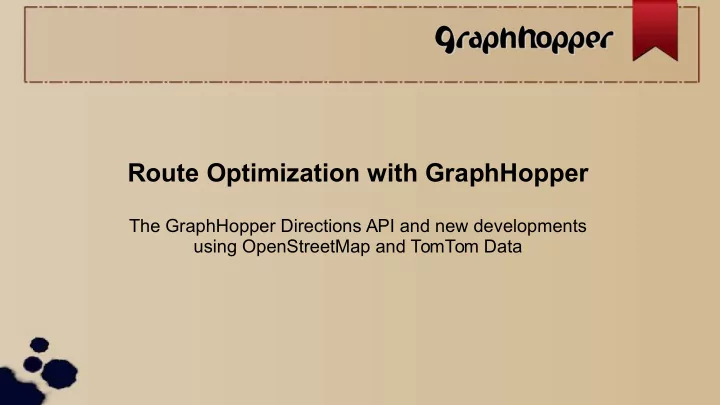

Route Optimization with GraphHopper The GraphHopper Directions API and new developments using OpenStreetMap and TomTom Data
Who we are
What we do Our software core is open source We use open data
Open vs. Closed
Route Optimization What is Route Optimization? https://www.graphhopper.com/blog/2017/09/18/route-optimization-explained/ Companies dealing with deliveries face vehicle routing problems: Find a way to service customers under certain customer requirements: ● time windows ● which vehicles and its available capacities ● e.g. refrigerated, must be picked up first ● driver skills and breaks
Route Optimization Roughly route optimization works like: 1. Customers send us problem wit: services or shipments, vehicles and all the constraints like time windows 2. Calculate distance and time matrix between all involved locations 3. Assign services/shipments to vehicles 4. Optimize order of those locations Point 3+4 happen at the same time always watching the constraints
Open vs. Closed Why TomTom? Customers demanded verified and known/trusted data source Improved ETAs through traffic data Compared to the other 2 world wide providers (HERE, INRIX) we got a better offer with good terms for our customers
Time-dependent Time-dependent route optimization Allows to utilize less vehicles and better arrival estimates Time-dependency is also direction-dependent, i.e. at a given time speed into city != out of city
Time-dependent Without historic traffic data all customers can be served with 6 vehicles in 8 hours and 55 min (regardless of start time)
Time-dependent Starting at 2am all customers can be served with 4 vehicles in 6 hours and 30min
Time-dependent Starting at 8am all customers can be served with 7 vehicles in ~11 hours Taking traffic into account can have considerable implications on total costs.
Fast Distance Matrix Optimization problems require calculating distance matrices Large problems (>100 locations) requires special routing algorithm (Otherwise infeasible response times) For more than 1000 locations even this algorithm takes minutes With time-dependent route optimization this got even more demanding due to many required distance matrices but This should be fast too!
Fast Distance Matrix That‘s what we did (single thread): new matrix matrix size old matrix 100² 2.4s 1.2s 500² 40s 4s 1000² 2.5min 8s 2000² 9.5min 22s
Visualization Not our strength but important for debugging and tuning Many possibility to visualize the time dependent traffic flow in one area One is: reachable area
Visualization Berlin: Time- dependent reachable areas of 1h for the different times of the day with different colors for different distances (blue = ‘far away’)
Visualization Time-dependent reachable areas (30min) with colors for different slowdown factors. Red roads mean that they are slower as its night speed.
Visualization How does the reachable area change over a typical weekday? The orange dots show the maximum reached distance
Visualization Peak is at different time for reverse reachable area (traveling into the city)
Routing Engine In 2018 we released v0.10 & 0.11 of our open source routing engine. New Features: Isochrone API is now open source too Path details (e.g. max speed, toll or surface info for the whole path) Elevation support for Northern Europe too Improved public transit (e.g. real time support) 30% faster routing for speed mode Hybrid routing also faster Easier to create navigation applications based on GraphHopper Moved to a more comfortable web framework (easier to use)
Routing Engine New Navigation Example based on a fork of the Mapbox Navigation SDK Shows how to utilize the Routing API and also Route Optimization API independent from Mapbox services Uses tiles from mapilion.com but can use any other too 100% open source (unlike the Mapbox Navigation SDK)
Routing Engine
Routing Engine We‘ll further invest into our open source routing engine Biggest goal for 2019: make it easier to customize and more flexible for non-Java developer
Route Optimization with GraphHopper Route Optimization with GraphHopper peter.karich@graphhopper.com
Recommend
More recommend